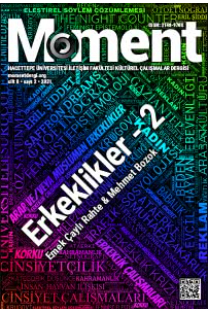ECHO: OR, ON THE ORIGIN OF WORDS
YANKI: VEYA SÖZCÜKLERİN KÖKENİ ÜZERİNE
___
Watkin, C. (2009). Phenomenology or deconstruction? The question of ontology in Maurice Merleau-Ponty, Paul Ricoeur and Jean-Luc Nancy. Edinburgh: Edinburgh University Press.Walker, R. (2015). Strategic management communication for leaders. (3rd ed.). Stamford, CT: Cengage Learning
Rizzuto, A. M. (2008). The Talking Cure and the Analyst’s Intentions. Psychoanalytic Review 95 (5), 729-749.
Raffoul, F. (2012). Abandonment. In B. C. Hutchens (Ed.). Jean-Luc Nancy: Justice, Legality, and World (65–81). New York, NY: Continuum.
Peirce, C. S. (1892). The law of mind. The Monist 2 (July), 533-559
Nancy, J.-L. (2008). Corpus. (R. A. Rand, Trans.). New York, NY: Fordham University Press.
Nancy, J.-L. (2007). Listening. (C. Mandell, Trans.). New York, NY: Fordham University Press.
Nancy, J.-L. (1993). The birth to presence. Translated by Brian Holmes and others. Stanford, CA: Stanford University Press.
Mead, G. H. (1934). Mind, self, and society: The definitive edition. C. W. Morris (Ed.). Chicago, IL: University of Chicago Press.
Lacan, J. (2004). Écrits: A selection. (B. Fink, Trans.). New York, NY: W. W. Norton & Company.
Lanigan, R. L. (2013, July). Human embodiment: An eidetic and empirical communicology of phantom limb. Paper presented at the 6th International Communicology Institute Summer Conference, Duquesne University, Pittsburgh, PA.
Lanigan, R. L. (1998). Phenomenology of communication: Merleau-Ponty’s Thematics in Communicology and Semiology. Pittsburgh, PA: Duquesne University Press.
Hamacher, W. (1993). Ou, séance, touche de Nancy. Paragraph, 16 (2), 216-231.
Geva, D. (Director). (2012). Noise [DVD]. Tel Aviv, IL: JMT Films Distribution.
Benveniste, E. (1973). Problems in general linguistics. M. E. Meek (Ed.). Miami, FL: University of Miami Press.
Agamben, G. (1991). Language and death: The place of negativity. (K. E. Pinkus with M. Hardt, Trans.). Minneapolis, MN: University of Minnesota Press.
- ISSN: 2148-970X
- Yayın Aralığı: 2
- Başlangıç: 2014
- Yayıncı: Hacettepe Üniversitesi İletişim Fakültesi
RETORİKTE ALAN TEMELLİ DÖNÜŞ VE KATILIMCI ELEŞTİREL RETORİK
THE EMPTINESS OF THE ONE-DIMENSIONAL SELF: BYUNG-CHUL HAN’S EXPULSION OF THE OTHER
INTERVIEW WITH RONALD C. ARNETT: PHILOSOPHY OF COMMUNICATION AS A FORM OF LITERATURE
VİDEO OYUNLARINDA ZAMAN VE MEKÂN: BİR TASLAK
YANKI: VEYA SÖZCÜKLERİN KÖKENİ ÜZERİNE
DAN PAGİS’İN ŞİİRİNDE BİR İLETİŞİM ARACI OLARAK SESSİZLİK
BEING GOVERNED THROUGH PLATFORMS: BETWEEN TECHNOLOGICAL DETERMINISM AND ITS CRITICISM
Film Endüstrisinin ve Sinema Kültürünün Gelişmesinde Busan Film Komisyonu’nun Rolü
